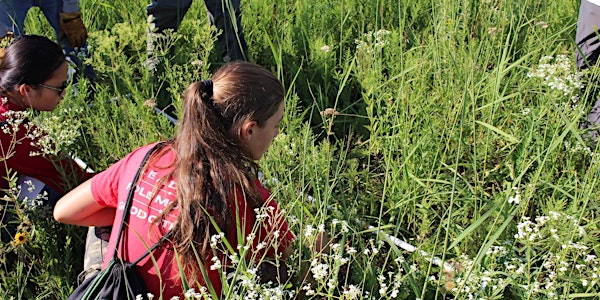
Registrations are closed
We're sorry, but registration for this volunteer opportunity has closed.
IMMP Training with Monarch Joint Venture
Attend an Integrated Monarch Monitoring Program training and help monitor monarch populations at priority sites in southcentral Wisconsin.
Location
About this event
The Natural Resources Foundation of Wisconsin and Monarch Joint Venture are recruiting volunteers to assist with an important citizen science opportunity that will help monitor monarchs and their habitat at priority sites in southwest Wisconsin.
Why we need your help
Monarch butterfly populations have decreased by more than 90 percent in just the last 20 years, and other pollinators are also on the decline, due to many factors, especially the loss of their habitat – including milkweed and other native plants.
Citizen scientists will play a key role in a landscape-scale project to create and enhance pollinator habitat on public lands by helping to monitor these sites through the Integrated Monarch Monitoring Program, collecting critical data on monarch butterflies and their habitat to help inform conservation efforts.
The project is a partnership between the Natural Resources Foundation of Wisconsin, Wisconsin Department of Natural Resources, and the Driftless Area Land Conservancy, and will establish nearly 2,000 acres of pollinator habitat across priority sites in southwest Wisconsin’s Driftless Area.
The priority monitoring sites include:
- Blackhawk Lake State Wildlife Area (Iowa County)
- Governor Dodge State Park (Iowa County)
- Hogback Prairie State Natural Area (Crawford County)
- Rush Creek State Natural Area (Crawford County)
- Yellowstone Wildlife Area (Lafayette County)
What’s required to participate?
Participation in this volunteer opportunity requires training in the Integrated Monarch Monitoring Program and a commitment to monthly volunteering (1-3 hours) at one of the priority sites listed above through September.
Training requires 1) watching 90 minutes of online training videos in advance and 2) attending one of the in-person trainings listed below. Training will equip you to monitor nectar resources and milkweed, search for monarch eggs and caterpillars, and record adult monarch behavior. At the training, you'll select which of these activities you'd like to conduct, where, and how frequently. Follow this link for more details on the IMMP activities.
We have two in-person trainings to choose from. Please register for 1 training only. Trainings are capped at 10 participants each.
Training Dates and Locations:
- Friday, June 25th from 1:30pm to 4:00pm at Blackhawk Lake State Wildlife Area (Iowa County)
- Saturday, June 26th from 10:00am to 12:30pm at Yellowstone Lake State Park (Lafayette County)
How to Register
To sign up for a training, click Register then choose one of the two training dates. On the registration form, you will indicate which priority site(s) you are interested in helping monitor; which type of monitoring activities you'd like to perform (i.e. monitoring milkweed, searching for eggs/larvae, recording adult monarchs) and your preferred level of time commitment.
You'll receive a registration confirmation email with a link to the video trainings to begin your IMMP journey! We will follow up in June with specific details about your training (i.e. parking and where to meet).
Thank you for your interest in supporting monarchs and pollinators through citizen science!
Registration for this opportunity closes on June 21 at 11:59pm.
Contact
If you have questions about registering for this event or about the Natural Resources Foundation of Wisconsin, please contact Outreach Coordinator, Caitlyn Schuchhardt at Caitlyn.Schuchhardt@WisConservation.org.
If you have questions about IMMP training in general or Monarch Joint Venture, please contact Jennifer Thieme at jthieme@monarchjointventure.org.
Organized by
The Natural Resources Foundation of Wisconsin provides sustainable funding for Wisconsin’s most imperiled species and ecosystems, while helping citizens explore, care for, and protect our state’s natural resources.